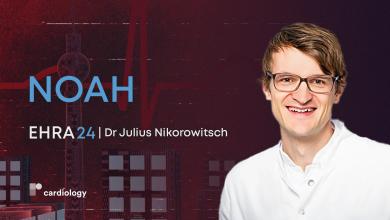Search results
Author(s):
Jean-Philippe Collet
,
Jochem Wouter van Werkum
Added:
3 years ago
Antiplatelet therapy is the standard of care for patients with acute coronary syndromes (ACS) and/or patients undergoing percutaneous coronary intervention (PCI) with stenting.1–3 Plaque rupture and/or iatrogenic vascular damage during PCI would normally result in the development of intravascular thrombus. Findings across multiple investigations consistently demonstrate the effectiveness of dual…
View more
Author(s):
Akira Matsumori
Added:
1 year ago
Author(s):
Paul A Gurbel
,
David Kandzari
Added:
3 years ago
The rare but catastrophic occurrence of stent thrombosis, in particular 'late' stent thrombosis, in association with deployment of drug-eluting stents has focused attention on the adequacy of the current dual anti-platelet regimen of aspirin and clopidogrel. Stent thrombosis is due to multiple factors. These include, specific stent features (delayed healing or polymer hypersensitivity),…
View more
Platelet Function Testing in Clinical Practice - Experience and Views from Europe and the US
Author(s):
Thomas O Bergmeijer
,
Jochem Wouter van Werkum
,
Udaya S Tantry
,
et al
Added:
3 years ago
Article
Author(s):
Hector M Garcia-Garcia
,
Patrick W Serruys
Added:
3 years ago
To date, cardiologists have alleviated the symptoms of patients with significant lesions in the coronary angiography by stenting or coronary artery bypass grafting. While normal-looking coronary segments in angiography have been regarded as ‘disease-free’ and mild/moderate stenoses as ‘non-treatable’, today that we know that from these non-significantly diseased areas may potentially arise acute…
View more
Author(s):
Julius Nikorowitsch
Added:
3 days ago
EHRA 24 - We are joined onsite by Dr Julius Nikorowitsch (University Heart and Vascular Centre Hamburg (UHZ), DE) to outline the impact of age, sex, cardiovascular comorbidities, and kidney function on outcomes with oral anticoagulation therapy in patients with device-detected atrial fibrillation in a substudy of the NOAH-AFNET 6 trial (NCT02618577).The substudy consisted of 2534 patients from…
View more
Cardiac Amyloid – An Update
Author(s):
Jason N Dungu
Added:
3 years ago
Article
Novel Oral Antiplatelet Agents
Author(s):
Suzanne J Baron
,
Robert P Giugliano
Added:
3 years ago
Article
Bill D Gogas
Job title: Editor-in-Chief, US Cardiology Review
Author
Author(s):
Cheng Keat Tan
,
David Bin-Chia Wu
,
Seh Yi Joseph Tan
,
et al
Added:
5 months ago













